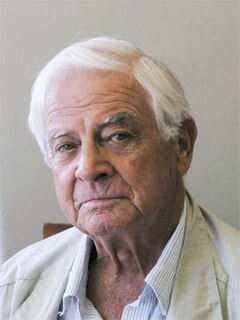Postcolonial literature is the literature by people from formerly colonized countries. It exists on all continents except Antarctica. Postcolonial literature often addresses the problems and consequences of the decolonization of a country, especially questions relating to the political and cultural independence of formerly subjugated people, and themes such as racialism and colonialism. A range of literary theory has evolved around the subject. It addresses the role of literature in perpetuating and challenging what postcolonial critic Edward Said refers to as cultural imperialism.

The Trappists, officially known as the Order of Cistercians of the Strict Observance and originally named the Order of Reformed Cistercians of Our Lady of La Trappe, are a Catholic religious order of cloistered monastics that branched off from the Cistercians. They follow the Rule of Saint Benedict and have communities of both monks and nuns that are known as Trappists and Trappistines, respectively. They are named after La Trappe Abbey, the monastery from which the movement and religious order originated. The movement first began with the reforms that Abbot Armand Jean le Bouthillier de Rancé introduced in 1664, later leading to the creation of Trappist congregations, and eventually the formal constitution as a separate religious order in 1892.

Country of My Skull is a 1998 nonfiction book by Antjie Krog about the South African Truth and Reconciliation Commission (TRC). It is based on Krog's experience as a radio reporter, covering the Commission from 1996 to 1998 for the South African Broadcasting Corporation. The book explores the successes and failures of the Commission, the effects of the proceedings on her personally, and the possibility of genuine reconciliation in post-Apartheid South Africa.
Olive Marjorie Senior is a Jamaican poet, novelist, short story and non-fiction writer based in Toronto, Ontario, Canada. She was awarded the Musgrave Gold Medal in 2005 by the Institute of Jamaica for her contributions to literature.
Ivan Vladislavić is a South African author, editor and professor. Vladislavić's style has been described as postmodern, innovative, humorous and unpredictable. Despite receiving critical acclaim, his work is not well known outside his home county.
Rose Zwi was a Mexican-born South African–Australian writer and anti-apartheid activist best known for her work about the immigrants in South Africa.

Karel Schoeman was a South African novelist, historian, translator and man of letters. Author of twenty novels and numerous works of history, he was one of South Africa's most honoured writers. Schoeman wrote primarily in Afrikaans, although several of his non-fiction books were originally written in English. His novels are increasingly being translated into other languages, notably, English, French and Dutch.

Olive Schreiner was a South African author, anti-war campaigner and intellectual. She is best remembered today for her novel The Story of an African Farm (1883), which has been highly acclaimed. It deals boldly with such contemporary issues as agnosticism, existential independence, individualism, the professional aspirations of women, and the elemental nature of life on the colonial frontier.

South African literature is the literature of South Africa, which has 11 national languages: Afrikaans, English, Zulu, Xhosa, Sotho, Pedi, Tswana, Venda, Swazi, Tsonga and Ndebele.

Patrick Roland Cullinan was a South African poet and biographer.

Gabeba Baderoon is a South African poet and academic. She is the 2005 recipient of the Daimler Chrysler Award for South African Poetry. She lives and works in Cape Town, South Africa, and Pennsylvania, USA, and serves as an Assistant Professor of Women's Studies and African and African American Studies at Penn State.

Foe is a 1986 novel by South African-born Nobel laureate J. M. Coetzee. Woven around the existing plot of Robinson Crusoe, Foe is written from the perspective of Susan Barton, a castaway who landed on the same island inhabited by "Cruso" and Friday as their adventures were already underway. Like Robinson Crusoe, it is a frame story, unfolded as Barton's narrative while in England attempting to convince the writer Daniel Foe to help transform her tale into popular fiction. Focused primarily on themes of language and power, the novel was the subject of criticism in South Africa, where it was regarded as politically irrelevant on its release. Coetzee revisited the composition of Robinson Crusoe in 2003 in his Nobel Prize acceptance speech.

Mike Schreiner is a Canadian politician who has served as the leader of the Green Party of Ontario since 2009. Schreiner sits as a member of Provincial Parliament (MPP), representing Guelph; his 2018 election made him the first and only Green Party member elected to the Legislative Assembly of Ontario.
The Olive Schreiner Prize has been awarded annually since 1961 to emerging writers in the field of drama, prose, or poetry. It is named after Olive Schreiner, the South African author and activist. It rewards promising novice work, by writers who are not yet regarded as "established" in the genre. It rotates annually among the genres of drama, prose, and poetry. The prize for each genre is therefore triennial, and is open to work published in the three years since it was last awarded.
The Thomas Pringle Award is an annual award for work published in newspapers, periodicals and journals. They are awarded on a rotation basis for: a book, play, film or TV review; a literary article or substantial book review; an article on English education; a short story or one-act play; one or more poems. It is named in honour of Thomas Pringle and administered by the English Academy of South Africa.
The African Leadership Academy (ALA) is a pre-university located in the outskirts of Johannesburg, South Africa. It is dedicated to 16 to 19-year-olds from Africa and the rest of the world, with alumni from 46 countries currently.
The anthropologist Leon E. Stover says of science fiction's relationship to anthropology: "Anthropological science fiction enjoys the philosophical luxury of providing answers to the question "What is man?" while anthropology the science is still learning how to frame it". The editors of a collection of anthropological SF stories observed:
Anthropology is the science of man. It tells the story from ape-man to spaceman, attempting to describe in detail all the epochs of this continuing history. Writers of fiction, and in particular science fiction, peer over the anthropologists' shoulders as the discoveries are made, then utilize the material in fictional works. Where the scientist must speculate reservedly from known fact and make a small leap into the unknown, the writer is free to soar high on the wings of fancy.
Imraan Coovadia is a South African novelist, essayist, and academic. He is the director of the creative writing program at the University of Cape Town. He has taught 19th-Century Studies and Creative Writing at a number of US universities. His debut novel, The Wedding, published simultaneously in the US and SA in 2001, has been translated into Hebrew and Italian.

Valeria Luiselli is a Mexican author living in the United States. She is the author of the book of essays Sidewalks and the novel Faces in the Crowd, which won the Los Angeles Times Art Seidenbaum Award for First Fiction. Luiselli's 2015 novel The Story of My Teeth was a finalist for the National Book Critics Circle Award and the Best Translated Book Award, and won the Los Angeles Times Book Prize for Best Fiction, and she was awarded the Premio Metropolis Azul in Montreal, Quebec. Luiselli's books have been translated into more than 20 languages, with her work appearing in publications including, The New York Times, Granta, McSweeney's, and The New Yorker. Her most recent book, Tell Me How It Ends: An Essay in 40 Questions, was a finalist for the Kirkus Prize in Nonfiction and the National Book Critics Circle Award in Criticism. Luiselli's 2020 novel, Lost Children Archive won the Carnegie Medal for Excellence in Fiction.
Bronwyn Law-Viljoen is a South African writer, editor, publisher and professor. She is the co-founder of the publisher Fourthwall Books and her own bookstore called Edition. She acts as the primary editor for works on law and history of South Africa and the architecture and building process of its constitutional court structures, along with artistic book publications of the work of William Kentridge. She has also published her own novel called The Printmaker.









